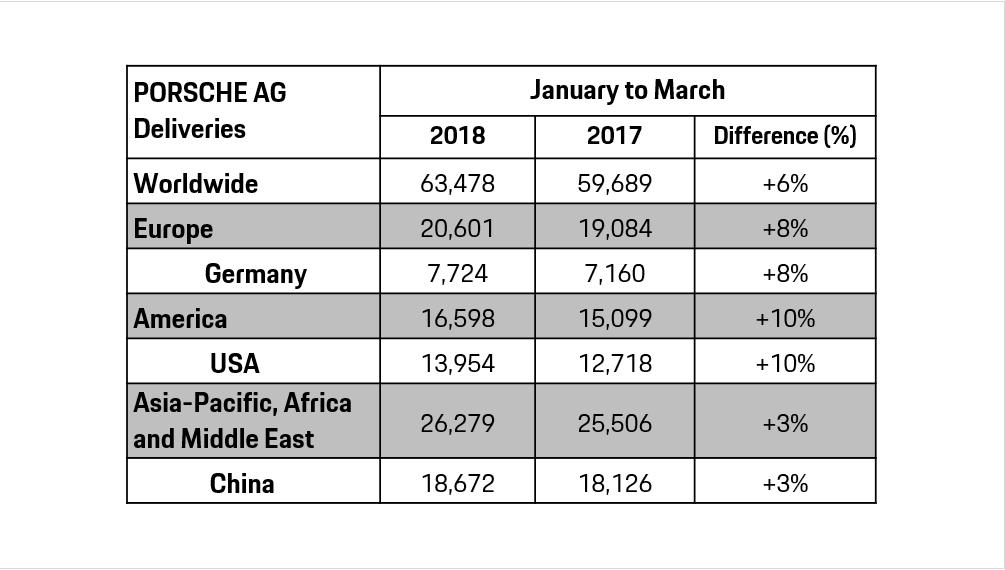The China Market And Its Implications For BMW, Porsche, And Competitors

Table of Contents
The Sheer Size and Growth Potential of the Chinese Automotive Market
Market Dominance and Future Projections
The Chinese automotive market is a behemoth. In 2022, it accounted for approximately 30% of global vehicle sales, showcasing its immense scale. Experts predict continued growth, with forecasts suggesting a sustained expansion in the coming years, fueled by a burgeoning middle class and rising disposable incomes.
- Market Size (2022): Over 26 million vehicles sold (Source: China Association of Automobile Manufacturers)
- Growth Rate (Projected): Moderate but steady growth, driven by increasing demand for luxury and electric vehicles (Source: International Energy Agency)
- Future Predictions: Continued expansion in the luxury segment, with significant potential for growth in electric vehicle sales.
The shifting demographics of China are a key driver. The expanding middle class possesses increasing disposable income, leading to a heightened demand for luxury goods, including premium automobiles. This demographic shift presents a lucrative opportunity for brands like BMW and Porsche.
Segment Specific Growth
Within the broader Chinese automotive market, specific segments are experiencing explosive growth.
-
Electric Vehicles (EVs): The Chinese government's strong push towards electric mobility, including substantial subsidies and incentives, has fuelled significant growth in the EV sector. This is creating both opportunities and challenges for established luxury brands.
-
SUVs: The popularity of SUVs continues to surge in China, reflecting a preference for spacious and versatile vehicles. This segment shows strong potential for luxury brands, with many introducing new SUV models tailored to the Chinese market.
-
Market Share (Luxury SUVs, 2023): BMW and Mercedes-Benz hold significant shares, but Chinese brands are rapidly gaining ground (Source: various market research firms).
These trends highlight the importance of adapting to evolving consumer preferences and investing in relevant vehicle segments.
Challenges and Opportunities for Luxury Brands in China
Intense Competition
The Chinese automotive market is fiercely competitive, with a diverse range of both international and domestic players vying for market share.
- Key Competitors (International): Mercedes-Benz, Audi, Volvo, and other global luxury brands.
- Key Competitors (Domestic): NIO, Xpeng, BYD, Li Auto – increasingly challenging established luxury brands with competitive pricing and advanced technology.
These competitors employ various strategies, including aggressive pricing, targeted marketing campaigns, and the introduction of technologically advanced features. Successfully navigating this competitive landscape requires a multifaceted approach.
Navigating Import Regulations and Tariffs
Importing vehicles into China involves navigating a complex regulatory environment.
- Import Duties and Tariffs: Significant tariffs and import duties can substantially increase the cost of imported vehicles.
- Certification and Compliance: Meeting stringent Chinese safety and emissions standards is crucial for gaining market access.
- Logistics and Supply Chain: Efficient logistics and a robust supply chain are vital for smooth operations within the Chinese market.
To overcome these challenges, many luxury brands have adopted strategies like local production to reduce costs and improve efficiency. Establishing strong partnerships with local suppliers is also crucial.
Understanding Chinese Consumer Preferences
Understanding the nuances of Chinese consumer preferences is vital for success.
- Brand Loyalty: While brand loyalty exists, it's not as deeply ingrained as in some other markets. Chinese consumers are discerning and value quality, innovation, and status.
- Technological Preferences: Chinese consumers are early adopters of technology, placing a high value on advanced features and connectivity in their vehicles.
- Aesthetic Tastes: Preferences for vehicle design and styling may differ from those in other markets. Luxury brands need to adapt their designs accordingly.
The Rise of Chinese Electric Vehicle Manufacturers
The rapid emergence of domestic Chinese EV brands poses a significant challenge.
- Prominent Chinese EV Brands: NIO, Xpeng, BYD, Li Auto have gained significant market share with innovative products and competitive pricing.
- Market Share Impact: The increasing market share of these brands puts pressure on established players to innovate and compete aggressively.
Established luxury brands are responding by investing heavily in their own EV offerings and developing tailored strategies for the Chinese electric vehicle market.
Strategic Responses from BMW, Porsche, and Competitors
Localization Strategies
Localization is key to success in the Chinese market.
- Local Production: Setting up manufacturing facilities in China significantly reduces import costs and improves responsiveness to local market demands.
- Strategic Partnerships: Collaborating with local suppliers and distributors builds strong relationships and improves market access.
- Tailored Marketing: Marketing campaigns need to resonate with specific Chinese cultural values and consumer preferences.
BMW and Porsche, among others, have already implemented extensive localization strategies, proving their commitment to long-term success in the market.
Investment in R&D and Innovation
Continuous investment in research and development is essential.
- Electric Vehicle Technology: Significant investments are being made in developing and producing electric vehicles tailored for the Chinese market.
- Autonomous Driving: Research and development in autonomous driving technologies are crucial for remaining competitive.
- Connectivity and Digital Features: Investing in advanced connectivity features and digital services caters to Chinese consumers' technological preferences.
These investments demonstrate the commitment of luxury brands to staying at the forefront of technological advancements and maintaining a strong competitive edge.
Digital Marketing and E-commerce
Leveraging digital channels and e-commerce is paramount.
- Social Media Marketing: Reaching Chinese consumers requires a robust presence on popular social media platforms like WeChat and Weibo.
- E-commerce Platforms: Utilizing e-commerce platforms like Tmall and JD.com is essential for online sales and customer engagement.
- Personalized Digital Experiences: Creating customized digital experiences enhances customer engagement and brand loyalty.
Conclusion
The China market presents both immense opportunities and significant challenges for BMW, Porsche, and their competitors. The sheer size of the market, the rapid growth of the EV sector, and the emergence of strong domestic brands necessitate a strategic and multifaceted approach. Successfully navigating this dynamic environment requires adapting strategies, embracing innovation, and developing a deep understanding of Chinese consumer preferences. Further research into the specific strategies of different players within the China market is essential for anyone seeking to understand the future of the global automotive industry. Understanding the intricacies of the China market is key to long-term success for luxury automotive brands worldwide.

Featured Posts
-
 The Fate Of Trumps Tax Bill Internal Gop Divisions And The Path Forward
May 22, 2025
The Fate Of Trumps Tax Bill Internal Gop Divisions And The Path Forward
May 22, 2025 -
 Arne Slots Post Match Analysis Liverpool Psg And Alissons World Class Performance
May 22, 2025
Arne Slots Post Match Analysis Liverpool Psg And Alissons World Class Performance
May 22, 2025 -
 Taylor Swift And Blake Lively A Friendship On The Rocks The Legal Battles Impact
May 22, 2025
Taylor Swift And Blake Lively A Friendship On The Rocks The Legal Battles Impact
May 22, 2025 -
 Hotel Fire Tweet Leads To Jail Sentence For Tory Councillors Wife Appeal Update
May 22, 2025
Hotel Fire Tweet Leads To Jail Sentence For Tory Councillors Wife Appeal Update
May 22, 2025 -
 Investigation Into Cwd Positive Elk At Jackson Hole Feedground
May 22, 2025
Investigation Into Cwd Positive Elk At Jackson Hole Feedground
May 22, 2025
Latest Posts
-
 The Latest On The Blake Lively Allegations A Comprehensive Overview
May 22, 2025
The Latest On The Blake Lively Allegations A Comprehensive Overview
May 22, 2025 -
 Exploring The Blake Lively Alleged Controversy What We Know
May 22, 2025
Exploring The Blake Lively Alleged Controversy What We Know
May 22, 2025 -
 Celebrity Feud Blake Livelys Sisters Rally Around Her
May 22, 2025
Celebrity Feud Blake Livelys Sisters Rally Around Her
May 22, 2025 -
 The Blake Lively Allegations Facts Speculation And Public Reaction
May 22, 2025
The Blake Lively Allegations Facts Speculation And Public Reaction
May 22, 2025 -
 Blake Livelys Reported Feud Family Offers Unwavering Support
May 22, 2025
Blake Livelys Reported Feud Family Offers Unwavering Support
May 22, 2025
